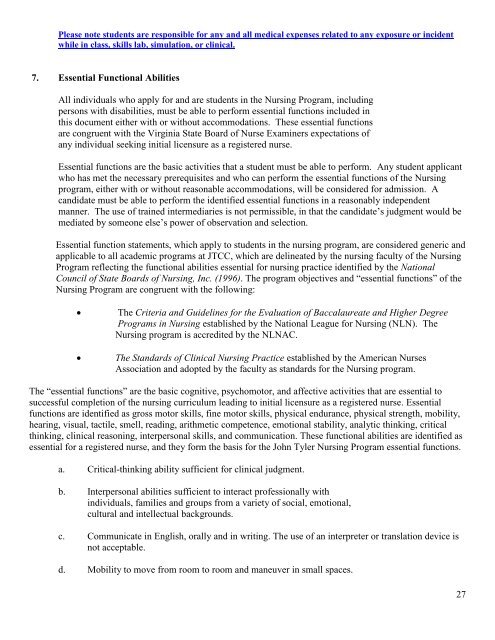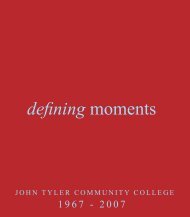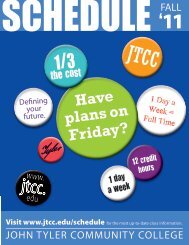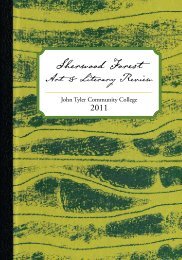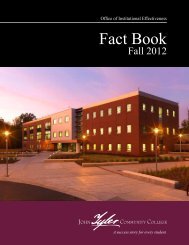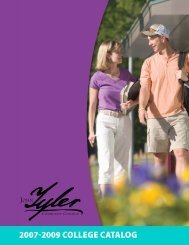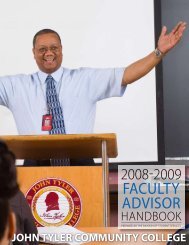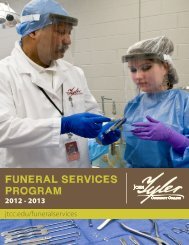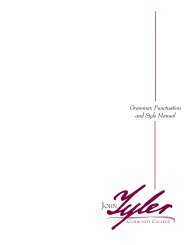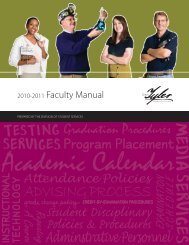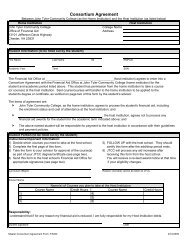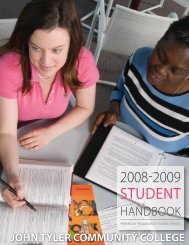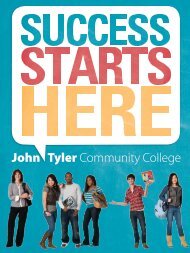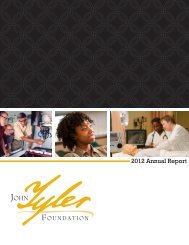Nursing Student Handbook - John Tyler Community College
Nursing Student Handbook - John Tyler Community College
Nursing Student Handbook - John Tyler Community College
Create successful ePaper yourself
Turn your PDF publications into a flip-book with our unique Google optimized e-Paper software.
Please note students are responsible for any and all medical expenses related to any exposure or incident<br />
while in class, skills lab, simulation, or clinical.<br />
7. Essential Functional Abilities<br />
All individuals who apply for and are students in the <strong>Nursing</strong> Program, including<br />
persons with disabilities, must be able to perform essential functions included in<br />
this document either with or without accommodations. These essential functions<br />
are congruent with the Virginia State Board of Nurse Examiners expectations of<br />
any individual seeking initial licensure as a registered nurse.<br />
Essential functions are the basic activities that a student must be able to perform. Any student applicant<br />
who has met the necessary prerequisites and who can perform the essential functions of the <strong>Nursing</strong><br />
program, either with or without reasonable accommodations, will be considered for admission. A<br />
candidate must be able to perform the identified essential functions in a reasonably independent<br />
manner. The use of trained intermediaries is not permissible, in that the candidate’s judgment would be<br />
mediated by someone else’s power of observation and selection.<br />
Essential function statements, which apply to students in the nursing program, are considered generic and<br />
applicable to all academic programs at JTCC, which are delineated by the nursing faculty of the <strong>Nursing</strong><br />
Program reflecting the functional abilities essential for nursing practice identified by the National<br />
Council of State Boards of <strong>Nursing</strong>, Inc. (1996). The program objectives and “essential functions” of the<br />
<strong>Nursing</strong> Program are congruent with the following:<br />
<br />
<br />
The Criteria and Guidelines for the Evaluation of Baccalaureate and Higher Degree<br />
Programs in <strong>Nursing</strong> established by the National League for <strong>Nursing</strong> (NLN). The<br />
<strong>Nursing</strong> program is accredited by the NLNAC.<br />
The Standards of Clinical <strong>Nursing</strong> Practice established by the American Nurses<br />
Association and adopted by the faculty as standards for the <strong>Nursing</strong> program.<br />
The “essential functions” are the basic cognitive, psychomotor, and affective activities that are essential to<br />
successful completion of the nursing curriculum leading to initial licensure as a registered nurse. Essential<br />
functions are identified as gross motor skills, fine motor skills, physical endurance, physical strength, mobility,<br />
hearing, visual, tactile, smell, reading, arithmetic competence, emotional stability, analytic thinking, critical<br />
thinking, clinical reasoning, interpersonal skills, and communication. These functional abilities are identified as<br />
essential for a registered nurse, and they form the basis for the <strong>John</strong> <strong>Tyler</strong> <strong>Nursing</strong> Program essential functions.<br />
a. Critical-thinking ability sufficient for clinical judgment.<br />
b. Interpersonal abilities sufficient to interact professionally with<br />
individuals, families and groups from a variety of social, emotional,<br />
cultural and intellectual backgrounds.<br />
c. Communicate in English, orally and in writing. The use of an interpreter or translation device is<br />
not acceptable.<br />
d. Mobility to move from room to room and maneuver in small spaces.<br />
27


